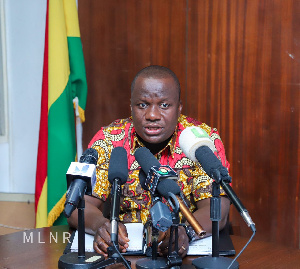 Minister of Lands and Natural Resources, Samuel A. Jinapor
Minister of Lands and Natural Resources, Samuel A. Jinapor
The Wildlife Resources Management Bill 2021 has been approved by the cabinet, the Ministry of Lands and Natural Resources has announced.
The Ministry in a statement welcomed the development which it says paves the way for the bill to be laid before Parliament.
“At its seventeenth meeting held on Thursday, October 28, 2021, Cabinet approved the new Wildlife Resources Management Bill, 2021, which seeks to revise and consolidate all laws relating to wildlife and protected areas, bring the new legislation into conformity with existing policies in the sector and provide for the implementation of international conventions on wildlife to which Ghana is a signatory,” a paragraph of the statement read.
Emphasizing the importance of the bill, the Ministry of Lands and Natural Resources said that the existing law on wildlife and protected areas lacks in certain aspects.
“The current legislation that governs wildlife and protected areas, the Wild Animals Preservation Act, 1961 (Act 43), the Wildlife Conservation Regulations, 1971 (L.I. 685) and the Wildlife Reserves Regulations, 1971 (L.I. 710) were enacted some fifty and more years ago, and are now not in tune with current international best practices for wildlife protection and management.”
It explained that the bill when passed will provide the Ministry with the legal backing and authority to enforce the laws on wildlife protection.
“To address these gaps and shortfalls in the current wildlife laws, a new Wildlife Resources Management Bill has been developed through a very extensive consultative process involving both state and non-state actors.
“The Bill provides for a new management structure to give legal backing to the involvement of local communities in wildlife management through the creation of Community Resources Management Areas (CREMAs) and provides higher penalties and sanctions regime for wildlife offenses, deterrent enough to protect our wildlife resources.
“Also crucial is the fact that, the Bill when passed, will provide for the implementation of several International Wildlife Conventions to which Ghana is a signatory, such as the Convention on Wetlands of International Importance Especially as Waterfowl Habitats (RAMSAR) 1971, the Convention on International Trade in Endangered Species of Wild Fauna and Flora, (CITES), 1973, the Convention on the Conservation of Migratory Species of Wild Animals (BONN) 1979, as well as several indicators in the Sustainable Development Goals (SDGs).”